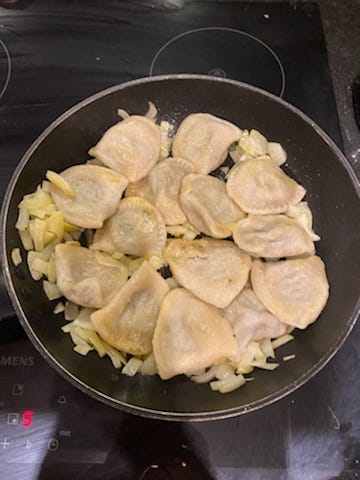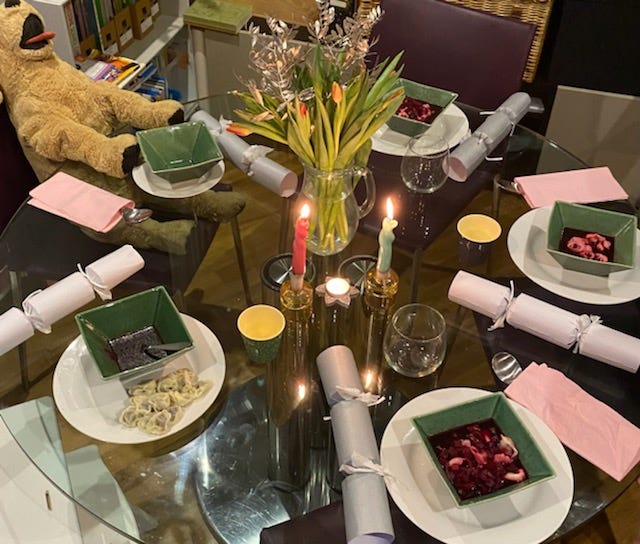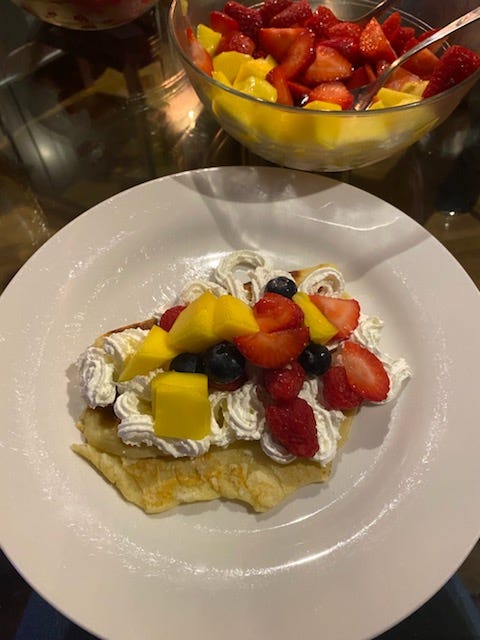Where Language, Culture (Food!) & Mothering Meet
On “Generational Curses”, Bilinguals Are Not Always Bicultural and Letting Go of Holiday Traditions
One of the many, and there are many, myths around bilingualism is that bilinguals are also bicultural. Some people use more than one language daily, but they do not consider themselves part of multiple cultures. And some people are bicultural but not bilingual, perhaps a topic for another newsletter as in certain situations, there can be a lot of pain and frustration when the biculturalism is there without the bilingualism.
As a Polish immigrant growing up in Canada, the focus in my family was on both the language and the Polish culture: we only spoke Polish in the home, I attended weekly classes, we followed Polish traditions, ate Polish food, saw Polish art, listened to Polish music — you get the picture. When I became a mother, I focused, and still do, on the Polish language with my children and less on the traditions. Although my partner has Polish ancestry, he doesn’t have the same experiences with the Polish culture as I do, so it is always a balance.

Although it is not necessary for passing on a language, immersing children in the culture of a place and its traditions can be helpful because there may be more exposure to the language, a critical factor in raising bilingual children. Also, children will likely form a connection with the culture and in turn, want to learn the language or at least that’s the best-case scenario. Creating that need for a language is another important part of raising bilinguals.
When my children were babies and toddlers, we used to spend Christmases in Poland with extended family, so it was easy to keep up with Polish holiday traditions as it was all there, all done for me. But for the past few years, we have been at home, in London, far from any Polish family. I have tried year after year to create what I consider a traditional Polish Christmas. (If you’re unfamiliar with Polish Christmas Eve, this is a good primer about the traditions and another one about food and the traditional 12 dishes.) We didn’t do or eat all of these, but I tried to incorporate as many traditions and foods from my own childhood as I could.

But finally last year, the pressure of the holidays, the mental load of Christmas, likely some other stuff from my past I have yet to deal with and trying to do it all, and all in “the Polish way” finally broke me. An hour before Christmas Eve dinner I burst into tears and had to hide in the bedroom from my family. I promised myself then that I would not repeat the scenario ever again.
I saw a lot of articles about motherhood and traditions before the holidays. Some were about keeping the holiday traditions, and adding new ones, others were about getting rid of them if they no longer (ever?) brought you joy.
I especially loved Lyz Lenz’s take on traditions in her newsletter Men Yell At Me. She writes about “the burdens of our mothers passed along to us”:
“All too often, we just take on the traditions we inherit. In the beginning, these traditions can feel like gifts, moments of continuity from one generation to the next. But after years and years of working to keep them up, to bake, wash, wrap, smile, dress, shine, sparkle, and then clean, they can become generational curses. The burdens of our mothers passed along to us. And we hold to them because we love our mothers and our grandmothers, or we want to try to love them at least. But I’ve come to believe that love should be about freedom. What are we holding onto these traditions for if they aren’t giving us joy? Why can’t we let them go?”
- Lyz Lenz, “Making Magic in Times of Loss”
For me, it was never really about my mother as I don’t think she ever loved the holidays either, but it was more about the (perceived) connection between being and speaking Polish and probably a bit of that childhood nostalgia you want to recreate with and for your own children.
I kept the promise I made to myself last year and let things go this year. On Christmas Eve for wigilia, the traditional dinner, we still had barszcz (red borscht, a.k.a. beetroot soup) with tiny mushroom dumplings called uszka. We still set a place at the dinner table for an unexpected guest (this is a bit of a weird one) minus the hay under the tablecloth (also a weird one) and my daughter promptly put her huge stuffed dog in the seat. Instead of fish, I made crepes with fruit and whipped cream just because we all love them and I avoided all the other parts of celebrating that no longer, or perhaps ever, brought me joy.

I kept reminding myself that my children are not less Polish because we had crepes for Christmas Eve dinner or that their Polish language will suffer because we did not share the opłatek (wafer), a wonderful tradition in theory as you essentially say nice things to people in honour of the new year, but an often stressful and uncomfortable one in practice, at least for me. We now open presents in the morning instead of the eve like I did as it makes much more sense for young kids, and we’ve added a few other things we try to do each year that are all our own.
Every week, my children do a one-hour Polish class online. Yesterday, I overheard their teacher asking about the holidays and traditions. They played a holiday-themed vocabulary game, and I was surprised they knew as much as they did about certain Polish things we do not do. Then, they told her about our crepes and all the things we did over the holidays, and they said it all in Polish.



